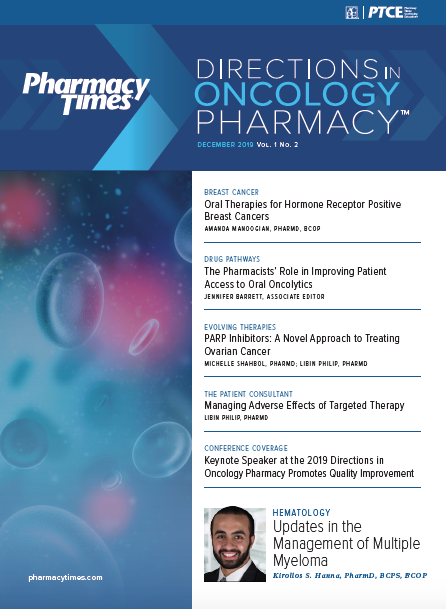
Publication
Article
Pharmacy Practice in Focus: Oncology
The Hidden Value Proposition for Institutional Oncology Specialty Pharmacy
Author(s):
The growth area for pharmacy revenue is increasingly apparent in the specialty space, a trend driven by the approvals of new oncology agents with characteristics that are ideal for the specialty pharmacy setting.
The growth area for pharmacy revenue is increasingly apparent in the specialty space, a trend driven by the approvals of new oncology agents with characteristics that are ideal for the specialty pharmacy setting. Much of the specialty pharmacy space has matured from adolescence to adulthood, so new players will need to find their niche and innovate to be successful and surpass the competition.
Interoperability Challenges Leave Care Gaps in Pharmacy
Many oncology products entering the US pharmaceutical market best serve patients in the institutional setting or in hospitals. These organizations can provide holistic medical care from an initial diagnosis through an entire course of therapy. A gap in care occurs when a prescription flows through a standalone or nonintegrated pharmacy in which the clinical professionals cannot access data beyond the patient’s current drug regimen or history. Pharmacy continues to suffer from a lack of interoperability, and data are limited to transactions that initiated through a pharmacy or commonly owned pharmacies. This data gap is even more critical because the specialty pharmacy must rely on patients or their caregivers for health care information. The patient is often left without the integrated, coordinated care required to fully manage their overall health needs during their cancer treatment.
Why Institutional-Based Oncology Specialty Care?
Institutional-based oncology specialty pharmacies not only provide drug therapy but also are an essential component of the total treatment regimen. These entities are engaged in the process of developing and implementing treatment protocols, including decisions on which oncology products are made available to the patients in their institution.
New oncology products are typically vetted, and the institutional specialty pharmacy has a preestablished oncology treatment plan in place that includes having the specialty products in stock or rapid stocking if they need to be ordered. This structured treatment plan comprises the necessary steps for administering the specialty product, including any investments in staff to as co-pay or patient assistance programs, to help patients with product access.
The Value Proposition for All Stakeholders
Several elements support the enhanced value proposition for an institutionally based, oncology-focused specialty pharmacy:
- Institutions share a common electronic medical record (EMR) and/or operating system that provides their specialty pharmacy access to a comprehensive medical record. This access helps the specialty pharmacy and other providers make better decisions.
- Within institutional oncology specialty pharmacy, pharmacists and other clinical staff can provide their services directly to a patient. That human touch often creates an environment that promotes more professional relationships, which in turn leads to better patient outcomes. As in community pharmacy, staff members often enjoy face time, which allows them to better read and react to the needs of a patient with cancer.
- Pharmacists, nurses, physicians, and other providers in an institutional setting interact continuously and operate in teams. This constant interaction promotes a collegial atmosphere in which decisions are often made collaboratively. The specialty pharmacy staff is likely to better understand how a medical team operates and what to anticipate based on the history of a physician’s usual treatment recommendations, which they can reinforce with the patient.
- Patients in an institutional oncology specialty pharmacy often receive their therapy much sooner than those in a traditional standalone specialty pharmacy. In traditional specialty pharmacy, providers must transmit the order before a medical record is set up. The product must then be approved by the payer, dispensed, and mailed, all before the patient receives education via the phone on how to take their medication and takes their first dose. This process often takes days compared with a few hours or less, typically, in an institutional setting. The faster turnaround could improve the patient’s overall health outcome.
- Pharmaceutical manufacturers that have invested millions to bring oncology therapies to market have an opportunity to concentrate communication and education efforts on a select group of clinical pharmacy professionals. Their investment into educating the oncology specialty pharmacy team will help lead to improved outcomes for patients prescribed their products. The manufacturer can best educate staff on any nuances of its products, including helping staff navigate reimbursement challenges they may experience in assuring patient access and, when necessary, providing support through patient assistance programs.
Documented Faster Turnaround Times
Oncologists commonly note that they have little to no knowledge regarding the cycle for a specialty product order that is sent to a traditional specialty pharmacy. Typical questions are “Did the patient start treatment later than recommended?” and “Did they take the right combination and on a consistent basis?”
Because these questions can affect quality and outcomes, institution-based physicians have pushed their organizations to create in-house oncology specialty pharmacies, which can significantly reduce turnaround times compared with external specialty pharmacies.
One organization conducted a study to measure the turnaround time differences, and the results were remarkable. The results showed that the average turnaround time for patients using the clinic-based oncology specialty pharmacy was significantly shorter than the average times for patients using external specialty pharmacies—with one health-system specialty pharmacy showing up to a 20.5-day difference.1
Specialty services that are integrated into institutional oncology specialty pharmacies can offer the personalized care required by patients on a specialty drug regimen. Compared with external specialty pharmacies, these institutions are better able to reduce turnaround times by proactively addressing barriers that delay patients from starting therapy.1
Institutions commonly develop oncology treatment protocols, often called pathways, and integrate them into their EMR or operating system. Commonly, oncology products are routed to the clinical team in the specialty pharmacy, where a staff member or a pharmacist verifies the order and then dispenses it to a patient. Upon discharge, that patient is followed in the system and may be contacted at predetermined intervals to assure they are adherent and are not experiencing any adverse reactions to their therapy. The pharmacy documents any communication in the EMR so the entire institutional oncology care team can access the patient’s data.
Institutional oncology centers can completely transform clinical care for their most vulnerable patients by providing a superior model in which the organization integrates and coordinates all aspects of clinical care. Considering that institutions provide accountable care and must accept risk in participating in a value-based health care system, oncology treatments must be managed at the highest level. In the absence of integrated care, patients are at risk of readmissions or progression of their cancer. Having a specialty pharmacy within an institution closes many potential gaps in the continuum of optimal care.
Now it is up to traditional specialty pharmacies to catch up with their institutional peers.
We welcome your feedback on this topic and on any topics you would like us to cover in future editions of Directions in Oncology Pharmacy™. Please contact me at [email protected]. And we also encourage you and your colleagues to subscribe to this unique journal by logging on to pharmacytimes.com.
Dan Steiber, RPh, operates Genesis Pharma Consultants, a consulting practice responsible for commercial operations and trade-supply chain strategy development. Steiber has served in several senior positions in pharmacy, distribution, and industry over the course of his 40-year career. Steiber is a licensed pharmacist in Texas, Washington, California, and Pennsylvania. He is affiliated with several professional associations and publications and a frequent speaker on behalf of many professional organizations. Steiber graduated from Washington State University College of Pharmacy. He has participated in a variety of postgraduate programs in law and business development/marketing at Harvard University and Northwestern University.

Newsletter
Stay informed on drug updates, treatment guidelines, and pharmacy practice trends—subscribe to Pharmacy Times for weekly clinical insights.
2 Commerce Drive
Cranbury, NJ 08512
All rights reserved.





